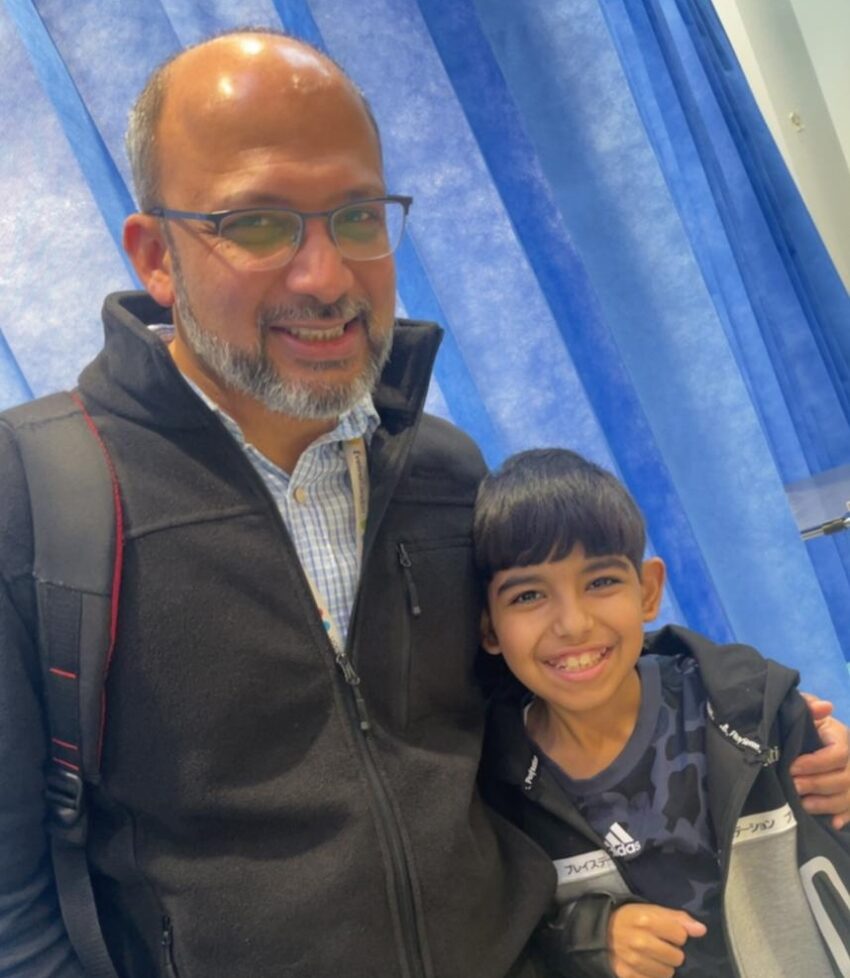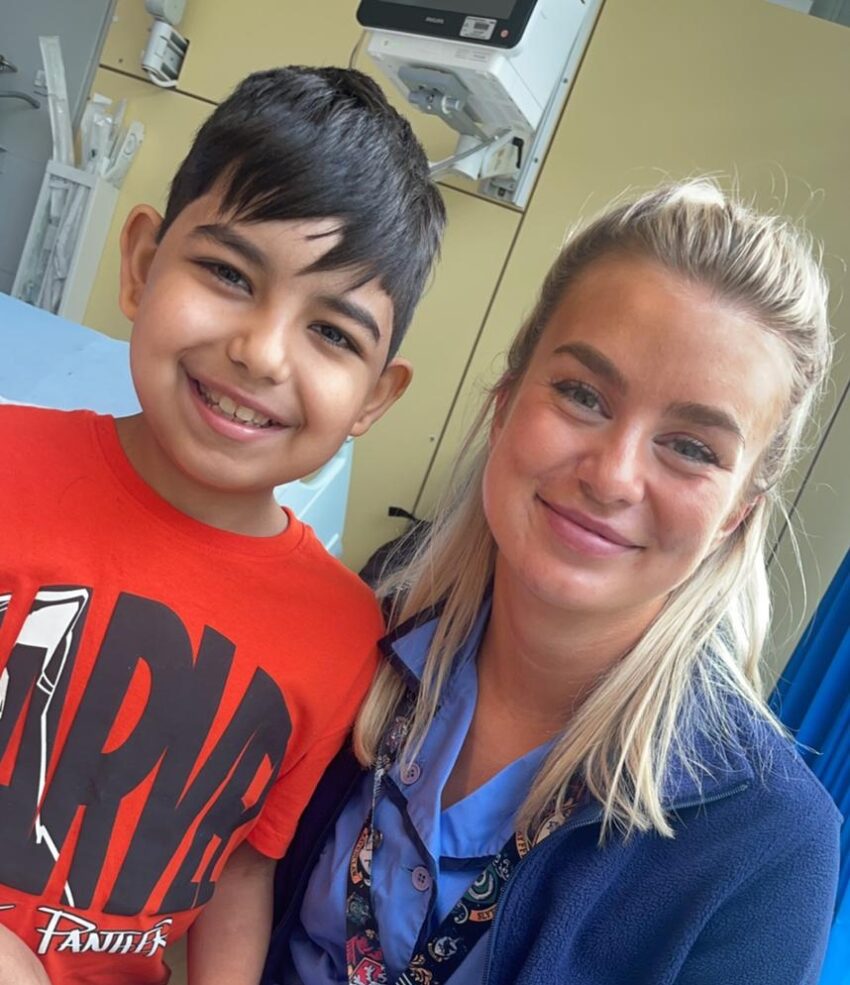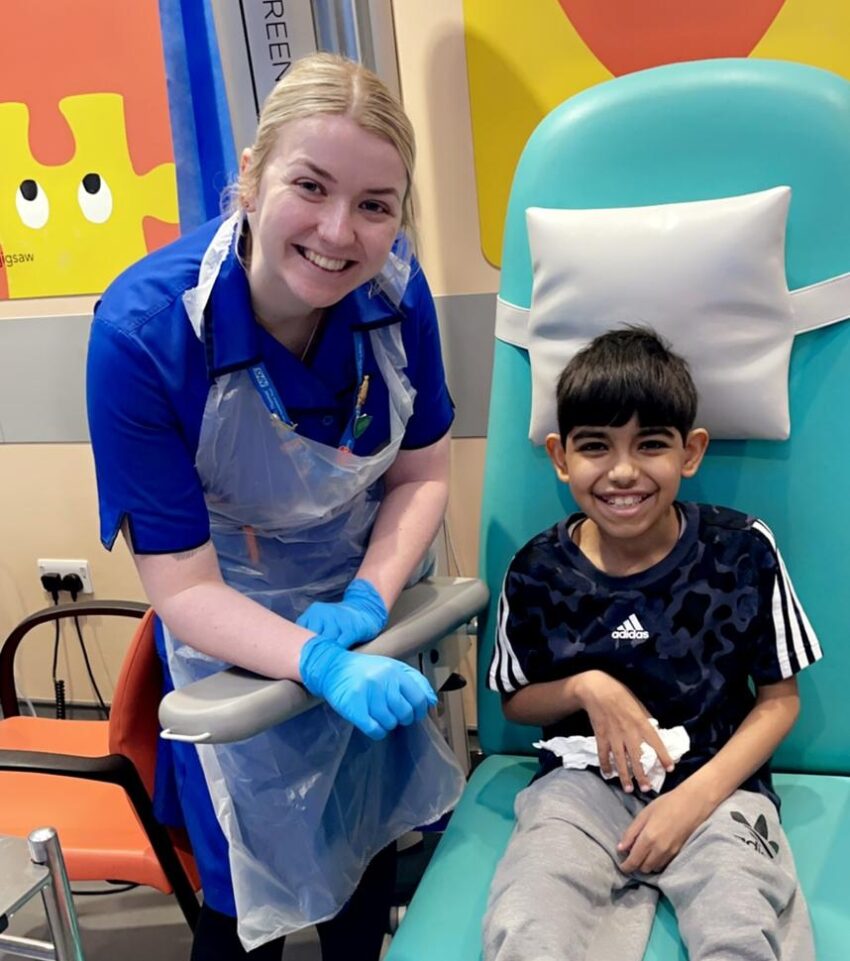Our paediatric kidney experts at Evelina London Children’s Hospital have helped an 11-year-old boy fulfil a simple ambition.
Saad Fahad Qasam Alawadhi’s wish to play and walk again came true after specialists helped him and his family manage the symptoms of complex primary nephrotic syndrome (NS).
What is nephrotic syndrome?
Nephrotic syndrome, also called idiopathic nephrotic syndrome (when the cause is unknown), causes the kidneys to suddenly leak protein from the blood into the urine (proteinuria). This rare childhood kidney condition affects 1 in 50,000 children a year in the UK and often worsens when an infection or illness compromises the immune system.
The main symptom of nephrotic syndrome is puffiness (oedema) of the body, particularly involving the face, legs and feet, and the drop in blood protein levels makes children feel extremely unwell. Diagnosis involves testing blood pressure, kidney function and protein levels in the blood and urine.
Treating steroid-sensitive nephrotic syndrome
Doctors typically treat the condition with an oral steroid medicine (e.g. prednisolone), which reduces inflammation and the immune system. In 85 – 90% of cases, children will respond well. If they get lots of flare-ups of nephrotic syndrome, they may need repeated courses of steroids at high doses or other similar medications.
The downside of steroids includes side effects like stomach upsets, mood swings, weight gain, and problems sleeping. However, in some children like Saad, steroid dependence or steroid resistance is seen. It means they do not respond to this standard treatment with steroids and will need additional drugs and specialist treatment to help suppress the immune system.
Saad's journey
The medical team in Kuwait began treating Saad for nephrotic syndrome in 2015 when he was 2 years old, where he had had a kidney biopsy performed 6 months following his initial presentation.
Saad was regularly in and out of the hospital to stabilise his condition with flare-ups whenever he got a cold or flu.
Saad’s mother said: “During the Coronavirus pandemic, my son was stable and well. But then, at the beginning of 2022, he became very unwell and was admitted to a hospital [in Kuwait]. He was in the hospital on New Year’s Day. So, I decided to start my application to return to London for treatment.”
The Kuwait Health Office referred Saad to Evelina London, which has the specialist skills to review his NS management.

Treatment for nephrotic syndrome
Evelina London provides internationally acclaimed renal, dialysis, transplantation and hypertension services in central London and has a specialist paediatric nephrology centre. As part of Guy’s and St Thomas’ NHS Foundation Trust, our expert teams can smoothly manage the transition to adult care at our adjoining St Thomas’ Hospital, providing ongoing care for life.
Professor Manish Sinha, Saad’s consultant paediatric nephrologist, explained the issues Saad faced: “For 7 years after he first presented, he had further intensive treatment in Kuwait, including Rituximab, a medication that helps control the immune system and prevent flare ups of the nephrotic syndrome. After that, however, whenever the effect of Rituximab reduced, or he had a chest infection, he would end up in intensive care.”
When Saad arrived at Evelina London, his mother said he was “in a bad state”. The swelling of his body meant he weighed 48kg, nearly twice his usual weight of 26kg, and because of this, he could not walk or breathe well at night and was distressed.
Professor Sinha immediately admitted Saad to the ward. He spent several weeks in Evelina London while Professor Sinha and a multidisciplinary team controlled his condition and optimised his treatment.
The team included world-renowned consultants in nephrotic syndrome, specialist kidney nurses, phlebotomists (who work with blood samples), dieticians and a play therapist.
The team are well versed in treating children with more complex nephrotic flare-ups. At any one time, around 150 children with the syndrome are under our care, all of them with complex idiopathic NS, which could be both steroid-sensitive or steroid-resistant NS.
Saad turns a corner
Some forms of steroid-resistant NS have a genetic link, but in nearly 70 out of 100 children, no genetic cause is found, as was the case with Saad.
However, we have one of the few teams of experts with the shared expertise and knowledge needed to assess Saad and ensure the best outcome for him. They decided to optimise his treatment to what he was getting at home.
In addition to giving Saad a higher dose of rituximab, Professor Sinha introduced a new monitoring system. If the medication’s effects start to reduce, doctors know to give him further doses. They also added other immunosuppressants and continued to give albumin, the main protein lost in NS. Albumin helps the blood become less ‘sticky’ and ensures enough water reaches the kidneys and other systems.

It was essential that Saad also got good nutrition as he grew up while allowing him to have as normal a childhood as possible. So, his paediatric dietitian at Evelina London limited the amount of salt he eats and encouraged a healthy diet with exercise.
By December 2022, with medication and dietary changes, the team had turned Saad’s condition around, and he walked out of Evelina London a happy patient.
Saad’s mother said: “Saad is much better now. He’s walking and has lost weight, for which he is grateful. He is a lot more comfortable and is smiling and laughing. Being able to walk and play can be all children wish for. My son being able to walk and play was huge.”
Management and risks
There is no cure for Saad’s form of NS, so his ongoing treatment is two-fold. One is managing the disease when he has an infection by increasing the steroids and ensuring he has adequate blood albumin levels. The second is giving him a combination of immunosuppressant medications to dampen his immune response, so if there is a flare-up, it makes him less unwell and causes fewer problems.
As for the future, Saad will have 2 infusions of rituximab about 2 weeks apart and is likely to need these every 6 to 9 months. He will also need to visit a clinic locally for monthly reviews.
The family expect to return Saad to Evelina London for ongoing management of his steroid-resistant NS and a kidney transplant in future if his kidney function fails.
Kidney transplantation is often necessary because proteinuria scars the kidneys and damages the fixed number of kidney filters humans are born with. Sadly, despite balancing their medication to keep their condition at bay carefully, dialysis and a kidney transplant are sometimes inevitable.
Professor Sinha explained: “The most significant risk to children with Saad’s aggressive, steroid-resistant nephrotic syndrome is losing kidney function, which means they often need dialysis before needing a new kidney. We don’t know why Saad presented with nephrotic syndrome when he was younger and why he has had such a difficult, aggressive clinical course.
“So, while we have controlled the severity with which his nephrotic syndrome behaves currently, we can’t switch the process off completely. Saad has significant underlying kidney failure, which requires careful monitoring and management. In the future, his kidney function will inevitably deteriorate further as he grows through puberty and adolescence.”
Saad’s 5-month period in the UK was intensely stressful and emotional for his mother, who was also miles away from her husband and 3 other children in Kuwait. However, our Arabic-speaking international team supported both mother and son closely.
“I was vulnerable and distressed when I arrived and throughout, but the team were like family,” said Saad’s mother. “I was almost breaking down when I arrived in the country, but I saw lots of other children who were unwell, some in worse situations than my child. We agreed to Saad’s tests to be used for further research as we wish to play a part in helping others who are in the same situation.”
Relief for Saad’s mother
Saad’s mother said: “I would like to thank the consultant who got him to the stage where he can walk and treated him humanely. The team at Evelina are amazing. I’d like to thank all the team – nurses, doctors and junior training doctors. They took such special care of Saad when he was coming regularly for his treatment. I would also like to thank the play therapist – the school is excellent at Evelina.”
For children with nephrotic syndrome, things will settle down and get better with medical intervention. However, for those with complex idiopathic NS, the optimal treatment is to navigate their clinical course safely through childhood by using various medications available and careful clinical management, which Saad can now do following his hospitalisation at Evelina London.

